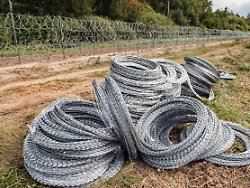Friday, October 8th, 2021
Against smugglers from Belarus
Twelve countries want EU money for border fences
Since Belarus illegally smuggled migrants into the EU, pressure on Brussels has increased. Twelve member states are demanding to be able to finance their border installations with community money. The signatories are also calling for the Schengen Borders Code to be adapted. Germany is not one of them.
The unwanted migration via Belarus into the EU is fueling the debate about protecting Europe’s external borders and dealing with migrants. Poland, Austria and ten other EU countries brought more barbed wire and fences into play in this context. “Physical barriers seem to be an effective border protection measure that serves the interests of the entire EU,” said a letter to the EU Commissioners in charge, Ylva Johansson and Margaritis Schinas. These should be financed “additionally and appropriately from the EU budget”. The letter is dated the day before today’s meeting of EU interior ministers in Luxembourg.
The dozen did not meet with much sympathy from Interior Commissioner Johansson with their ideas. You have nothing against EU countries building fences, said the Swede after the ministerial meeting. But would it be a good idea to use EU money for this? “I do not think so.” She made several suggestions on how the external borders could be better protected and monitored. These would be on the table, but would have to be accepted. There was also opposition from Luxembourg’s Foreign Minister Jean Asselborn. He was “absolutely not” in favor of building more walls, said the Luxembourger. You have to know who is coming to the EU, but he is firmly against placing all arriving migrants in internment camps.
Hybrid threat: EU legal framework to be adapted
With their demands, the twelve states refer to the situation on the border between Belarus and the EU states Poland, Lithuania and Latvia. The Belarusian ruler Alexander Lukashenko is accused of bringing migrants from crisis regions to the EU’s external border in an organized manner and thus destabilizing the international community. The twelve signatories are now calling for the EU legal framework to be changed in such a way that “attempts to instrumentalize illegal migration with political goals and other hybrid threats” can be adequately addressed.
Poland, Lithuania and Latvia have already reacted with reinforced border guards and started building hundreds of kilometers of border fences. Several people have died in the past few weeks in the border area between Poland and Belarus. Aid organizations accuse the EU countries of illegally repelling migrants to Belarus – without the possibility of applying for asylum.
Germany, France, Spain and other countries where the large number of asylum applications are made did not sign the letter. Instead, Hungary, Bulgaria, Cyprus, the Czech Republic, Latvia, Lithuania and Denmark are included. Their proposals are aimed at the planned reform of the Schengen Borders Code, which the EU Commission initiated in June. Among other things, they also demand clear rules on how the EU states can react in the event of “hybrid attacks” such as in the case of Belarus. Slovenia, which currently holds the rotating EU Council Presidency, also signaled its approval for the paper in the afternoon.
Forced rejections in Croatia and Greece
The debate is also taking place against the background of the latest reports of illegal and sometimes brutal rejections of people seeking protection at the external borders of Croatia and Greece. Video recordings made by a European research network, which became public this week, are supposed to prove serious and systematic human rights violations by masked uniformed men on the Croatian border with Bosnia. At the same time, Greece’s coastguard is accused of putting asylum seekers on life rafts, pulling them back into the open sea and then leaving them to their own devices. Indications that the special forces and their equipment have been financed with EU funds are also explosive.
Pushback allegations have already been raised against both countries several times in the past. The Greek migration minister, Notis Mitarakis, promised to clarify the situation. Every allegation is being investigated, as he said the previous evening to EU Interior Commissioner Johansson. However, the Swede was not very convinced of his statements. She made it clear that she would not accept that Greece would not investigate the allegations. “We have to protect our external borders, but we also have to defend our values, the rule of law and fundamental rights.” The Croatian government, however, takes the allegations very seriously, said Johansson. The minister was shocked.
Meanwhile, the Lithuanian government announced that the country had already received almost 30 million euros from the EU Commission to cope with the influx of migrants on the border with Belarus. The aim of the grant is to cover the costs of housing and basic supplies for refugees who have illegally entered the Baltic EU country. The rest of the support totaling 37 million euros is to follow at a later date. This is also intended to pay surcharges for civil servants and security guards in the migrant camps.
